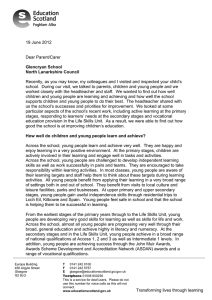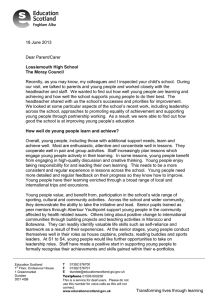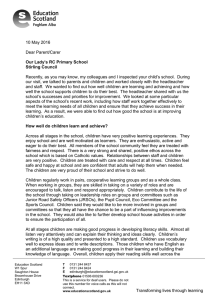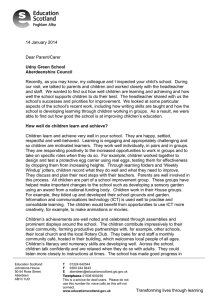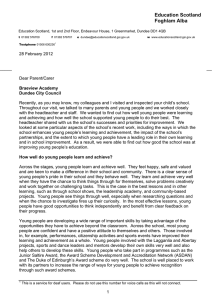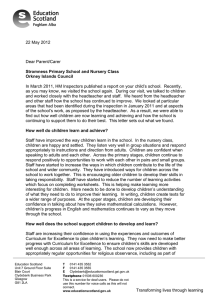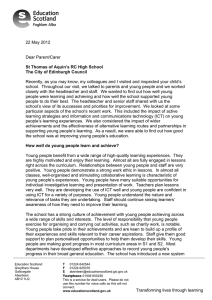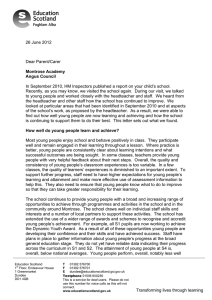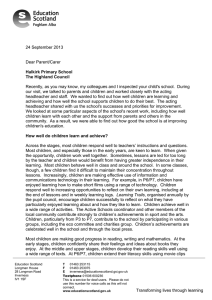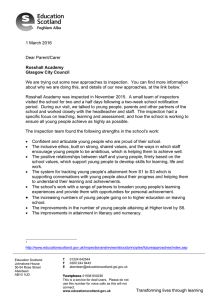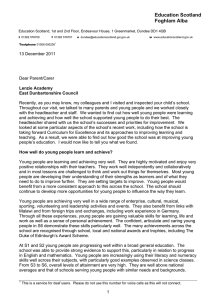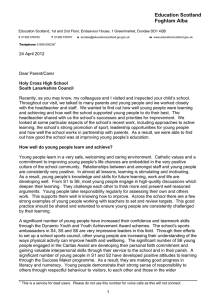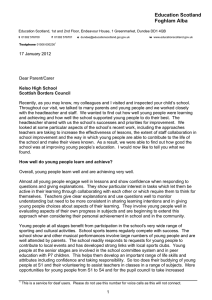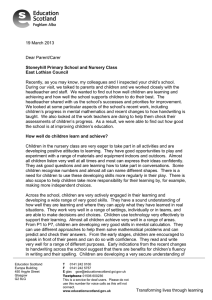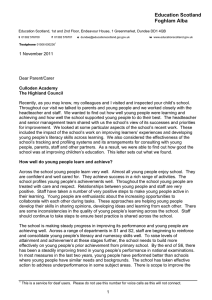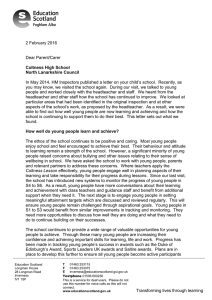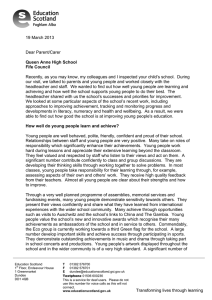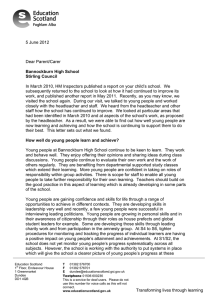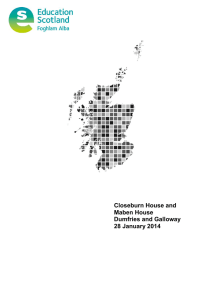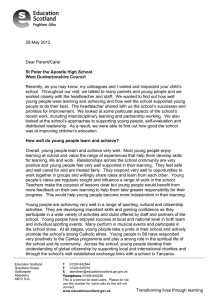29 October 2013 Dear Parent/Carer
advertisement
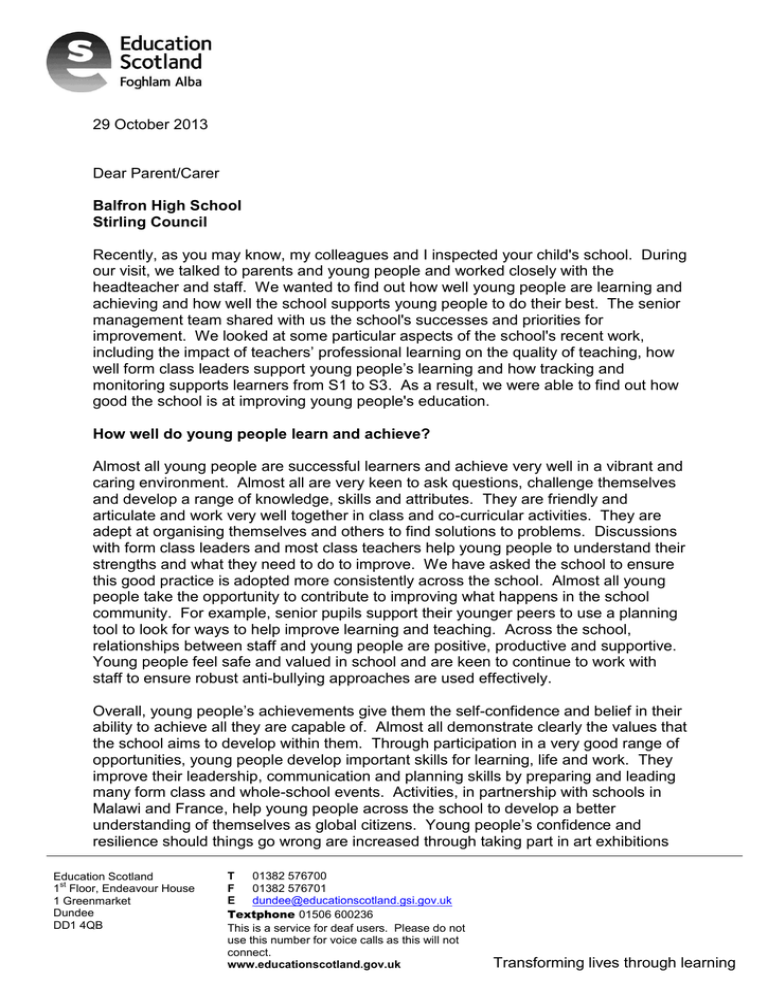
29 October 2013 Dear Parent/Carer Balfron High School Stirling Council Recently, as you may know, my colleagues and I inspected your child's school. During our visit, we talked to parents and young people and worked closely with the headteacher and staff. We wanted to find out how well young people are learning and achieving and how well the school supports young people to do their best. The senior management team shared with us the school's successes and priorities for improvement. We looked at some particular aspects of the school's recent work, including the impact of teachers’ professional learning on the quality of teaching, how well form class leaders support young people’s learning and how tracking and monitoring supports learners from S1 to S3. As a result, we were able to find out how good the school is at improving young people's education. How well do young people learn and achieve? Almost all young people are successful learners and achieve very well in a vibrant and caring environment. Almost all are very keen to ask questions, challenge themselves and develop a range of knowledge, skills and attributes. They are friendly and articulate and work very well together in class and co-curricular activities. They are adept at organising themselves and others to find solutions to problems. Discussions with form class leaders and most class teachers help young people to understand their strengths and what they need to do to improve. We have asked the school to ensure this good practice is adopted more consistently across the school. Almost all young people take the opportunity to contribute to improving what happens in the school community. For example, senior pupils support their younger peers to use a planning tool to look for ways to help improve learning and teaching. Across the school, relationships between staff and young people are positive, productive and supportive. Young people feel safe and valued in school and are keen to continue to work with staff to ensure robust anti-bullying approaches are used effectively. Overall, young people’s achievements give them the self-confidence and belief in their ability to achieve all they are capable of. Almost all demonstrate clearly the values that the school aims to develop within them. Through participation in a very good range of opportunities, young people develop important skills for learning, life and work. They improve their leadership, communication and planning skills by preparing and leading many form class and whole-school events. Activities, in partnership with schools in Malawi and France, help young people across the school to develop a better understanding of themselves as global citizens. Young people’s confidence and resilience should things go wrong are increased through taking part in art exhibitions Education Scotland st 1 Floor, Endeavour House 1 Greenmarket Dundee DD1 4QB T 01382 576700 F 01382 576701 E dundee@educationscotland.gsi.gov.uk Textphone 01506 600236 This is a service for deaf users. Please do not use this number for voice calls as this will not connect. www.educationscotland.gov.uk Transforming lives through learning and musical productions, including the successful ‘Hairspray’. Groups such as the eco-schools group, science club and news club help a significant number of young people to learn how to evaluate environmental, scientific and moral issues. The school is developing a system to collate evidence about progress in S1 to S3 across all areas of the curriculum. In national examinations, young people perform above the national average and well above schools which serve young people with similar needs and backgrounds. Over the last three years, almost all young people have left school to enter further and higher education, training or employment. How well does the school support young people to develop and learn? The school has highly effective systems in place to ensure young people develop as well as they can and receive the pastoral support they require. In a few lessons, teachers could provide more appropriate work to support or challenge some young people to learn more effectively. There is very effective monitoring and tracking in place to assess the needs of young people across the school, including those who require additional support. Particularly effective is the responsiveness of form class leaders to intervene and support young people as soon as possible. Senior managers, pastoral care teachers and learning support staff, together with teachers and young people in the house system, all ensure young people’s needs are known, assessed and addressed very effectively. The school has strong links with partner agencies which help to meet the needs of a range of young people, including those who are looked after, those too ill to attend school and young people with dyslexia. Teachers plan learning very well to develop the knowledge, skills and attributes identified in Curriculum for Excellence. They are confident when planning learning in in all areas of the curriculum from S1 to S3 and ensure all young people receive their entitlements. Young people have opportunities to learn through curriculum areas, subjects, a range of personal achievements and interdisciplinary learning. During S1 to S3, young people are able to make connections across their learning well. The planned learning around the Commonwealth Games aims to develop young people’s understanding of themselves as ‘global citizens in the making’. Teachers continue to keep courses under review. They are aware that the development of literacy, numeracy and health and wellbeing are the responsibility of all and plan learning accordingly. The school should continue to review the curriculum along with its partners. This will ensure young people make strong progress in their learning at all stages, and have a flexible range of opportunities to learn in the senior phase. How well does the school improve the quality of its work? The school improves the quality of its work very effectively. As a result of strong leadership at all levels, there is continuous monitoring of the school’s work, and effective management of planning for improvement. The new headteacher places improvement of learning and teaching at the centre of the school’s strategic direction. She has built strong relationships with young people, staff and parents. She has recognised that while the school is in a strong position to continue to improve, there are aspects of the curriculum which need to be revisited to ensure all young people achieve as highly as they can. The depute headteachers provide very effective support and challenge to staff and carry out their remits well to ensure continuous improvement to learning and teaching. There is a strong culture of professional 2 learning amongst staff. They engage in various approaches to evaluating and improving their work with an increasingly clear focus on outcomes for young people. The headteacher’s recent survey of staff, young people and parents raised awareness of some key issues which are now being addressed. The involvement of young people in leading work which helps to shape the future of learning across the school is exemplary. The school should continue to improve the tracking and monitoring of young people’s progress from S1 to S3. Overall, the school is in a strong position to continue to improve. This inspection found the following key strengths. Very high levels of achievement of young people. Development of a strong culture of learning across the school. The demonstration by young people of the school’s values. The very high quality provision of pastoral support for young people. The very effective leadership for learning provided by the headteacher and the strong relationships she has built with young people, parents, staff and the local community. We discussed with staff and Stirling Council how they might continue to improve the school. This is what we agreed with them. Continue to improve the way teachers personalise learning to meet the needs of all young people. Continue to review the curriculum, including the tracking and monitoring of achievement, to ensure all young people make appropriate progress. What happens at the end of the inspection? We are very satisfied with the overall quality of provision. We are confident that the school's self-evaluation processes are leading to improvements. As a result, we will make no further visits in connection with this inspection. As part of its arrangements for reporting to parents on the quality of education, Stirling Council will inform parents about the school's progress. David Gregory HM Inspector Additional inspection evidence, such as details of the quality indicator evaluations, for your school can be found on the Education Scotland http://www.educationscotland.gov.uk/inspectionandreview/reports/school/primsec/Balfr onHighSchoolStirling.asp If you would like to receive this letter in a different format, for example, in a translation please contact the administration team on the above telephone number. If you want to give us feedback or make a complaint about our work, please contact us by telephone on 0141 282 5000, or e-mail: complaints@educationscotland.gsi.gov.uk or write to us addressing your letter to the Complaints Manager, Denholm House, Almondvale Business Park, Livingston EH54 6GA. 3
